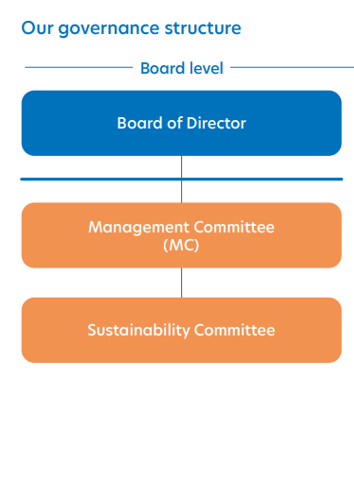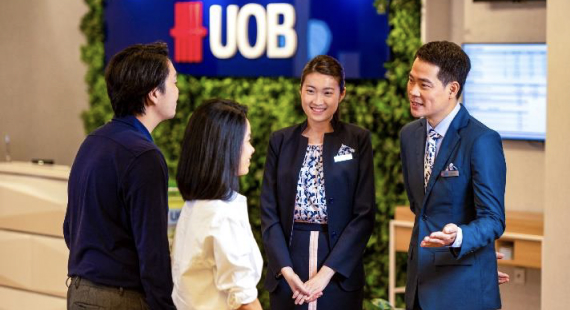
Governance
Sustainability is the responsibility of all UOB Thailand employees. As part of our commitment to sustainable and responsible growth, we identify, assess and manage social and environmental risks, challenges, impact and opportunities. This is carried out within a robust governance framework, underpinned by policies and guidelines that define our commitment and guide our approach to conducting business.
Governance structure

UOB Thailand’s Board of Directors and the Management Committee(MC) review long-term business and organisational goals and provide the strategic direction for the Bank’s sustainability practices, including those addressing climate change-related issues. They review, determine and oversee the management and monitoring of the Bank’s material environmental, social and governance (ESG) factors and their scope, as well as evaluate relevant key performance indicators. They also review and approve relevant disclosures.
The Sustainability Committee (SC) reports directly to the MC on sustainability matters. This ensures that ESG matters are given due consideration in all aspects of our operations. The SC members represent the Bank’s business and support units whose activities have the potential to impact the environment, society and the economy positively and negatively. The SC reviews material ESG topics, identifies risks and opportunities, sets goals and targets, evaluates emerging issues, collates and assesses relevant data, and monitors the progress of sustainability-related programmes and initiatives.
Sustainability Framework
The Sustainability Framework was formalised in 2020. Underpinned by policies and guidelines that define our commitment and guide our approach to conducting business, the framework supports UOB Thailand’s business decision-making at all levels. It provides guidance on the management of sustainability-related risks and business opportunities in the context of our direct and indirect impact to the environment, society and the economy.
It is the responsibility of all UOB Thailand employees to comply with the Sustainability Framework. The management teams of the UOB Thailand are responsible for appraising the relevant sustainability issues in their respective domains and for taking appropriate steps to ensure that customers and suppliers also meet relevant policy requirements, wherever applicable. Sustainability indicators are integrated into the Key Performance Indicators and appraisal process for colleagues from relevant functions.
Risk-focused Organisational Culture
UOB Thailand’s risk culture influences the decisions and actions taken by all employees throughout the organisation. Our robust risk culture productively strives to uphold our core values as we create long-term value for our stakeholders and safeguard our reputation. It promotes the appropriate risk awareness, judgement and behaviours required for risk-taking within UOB Thailand’s risk governance framework. Having a sound risk culture is the foundation for effective risk management and ensures that all material risks are systematically identified, assessed, monitored, escalated and addressed in a timely manner.


To promote awareness of and instil risk culture across the Group, we:
- require all employees to complete, on an annual basis, a mandatory UOB Risk Culture e-learning module, as well as training aimed at reinforcing risk-focused conduct in areas such as the UOB Code of Conduct, anti-money laundering, operational and security risks, financial crime prevention, information security and cyber risk awareness, and the UK Bribery Act;
- require key business and support units to conduct a self-assessment annually to evaluate the risk culture within each of their units;
- feature senior leaders and their views frequently on risk culture, as well as case studies and lessons learnt on our intranet;
- ensure consistent Bank-wide communications through in-person meetings, discussion groups and internal bulletins to foster deeper understanding and practice of risk management across the organisation;
- include risk management-related questions in our employee engagement survey to gauge the understanding of the prevailing risk culture across the Group; and
- survey senior management committees to assess their openness and robustness to challenges and their considerations of risks in their decision-making process.
Whistle-blowing
Our colleagues will be able to raise matters of potential concern through an independent channel in a secured manner without fear of reprisal. All reported cases are treated with the utmost confidentiality and swiftly investigated by Internal Audit Function. The status of all whistleblowing cases is closely tracked and reported to the Audit Committee every quarter.
Reports may be sent by post to the Head of Internal Audit at United Overseas Bank (Thai) Public Company Limited (UOB Thailand), 690 Sukhumvit Rd., Khlong Tan, Khlong Toei, Bangkok 10110 or by email to whistleblowing@uob.co.th.
Prohibiting insider trading
All our employees are expected to act honestly and with integrity, including regarding the information that they obtain in the course of their work. All employees are required to adhere to the UOB Group Policy on Personal Trading in Securities, which governs the prohibition of insider trading and sets the framework for the management of insider trading risks. They are also required to complete annually an online learning module on insider trading and market misconduct.
UOB Thailand has in place a Pre-Trade Clearance System that requires employees, who may reasonably be expected to have access to inside information, to make declarations and to seek approval before executing their trades on the stock exchanges.







